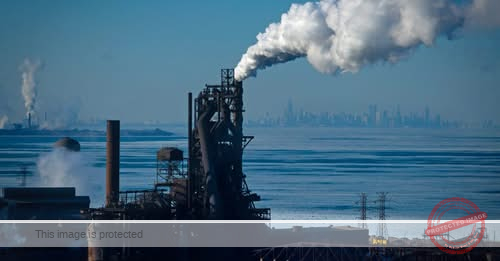
U.S. Steel has applied for two-year exemptions from hazardous air pollutant rules for integrated iron and steel, coke and taconite iron ore process, according to a form sent to the U.S. Securities and Exchange Commission.
“To preserve American jobs and domestic steel production, industries like ours must be able to rely on and play by rules that are well-grounded in science and law,” said a statement from a U.S. Steel spokesperson.
A Tuesday statement said that seeking the presidential exemptions doesn’t mean the company isn’t “supportive of revisions to regulations that are within (the Environmental Protection Agency’s) statutory authority, based on sound science and are technically feasible.”
U.S. Steel challenged all three rules because they were not supported by science or law and would impose significant costs while setting technically unachievable standards, the statement said.
“The presidential exemptions provide an additional path to achieving reasonable, effective environmental standards, which we support as part of our commitment to environmental standards, which we support as part of our commitment to environmental excellence and to being a good neighbor in the communities where we live and work,” the statement said. “These requests do not change our continued commitment to environmental performance and safety.”
In March, the EPA announced corporations could apply for presidential exemptions to sections of the Clean Air Act, which is to advance President Donald Trump’s executive orders, according to the agency’s website. Exemptions can be extended for up to two additional years and can be renewed
Corporations could apply for presidential exemptions by March 31, according to the EPA website. An analysis by the Environmental Defense Fund and Environmental Law and Policy Center showed that more than 500 facilities were invited to apply for the exemptions.
Hilary Lewis, steel director at Industrious Labs, said in an email to the Post-Tribune that she’s concerned about the company applying for exemptions, especially as U.S. Steel is the operator of two coal-based steel mills, including Gary Works.
Updated EPA rules fell short in many ways, Lewis said, but they were a step in the correct direction. The iron and steel rule would reduce hazardous air pollutants by 640 tons from 2026-2035, according to the Federal Register’s website.
“Complying with the law isn’t and shouldn’t be optional, particularly when it comes to protecting public health,” Lewis said. “For all of these rules, it is shameful that the administration is allowing corporations to continue harming the health of nearby communities, and that companies are asking to do so.”
In October, Industrious Labs released a report that found coal-based steelmaking contributes to an estimated $13.2 billion in health costs, contributing to 892 premature deaths and almost 100,000 lost school and work days annually, according to Post-Tribune archives. The report found that most Gary residents are in the top 10% of U.S. residents most at-risk for developing asthma and at-risk of low life expectancy.
Gary Advocates for Responsible Development sent a letter to U.S. Steel on April 16, asking if the company had applied for exemptions. Gary Works is one of the largest sources of air pollution in Northwest Indiana, the letter said.
On Wednesday, a GARD statement said that the organization is “deeply disappointed and concerned” about the corporation’s decision to apply for exemptions.
“Regardless of this cruel financial decision on the part of U.S. Steel to limit what they should pay to protect communities and workers, GARD will continue to monitor their permits and continue to educate the public while working for sustainable development that will improve the quality of life,” GARD’s statement said.
Just Transition Northwest Indiana joined GARD in sending a letter to U.S. Steel about the exemptions. A Wednesday statement from the Northwest Indiana advocacy organization said “it’s unacceptable” that the EPA’s application process was anonymous.
“Northwest Indiana is already home to some of the worst air pollution in this country,” the JTNWI statement said. “In this region, we suffer from a cumulative, generational impact of exposure to industrial toxins in communities like Lake County, Indiana. These exemptions are a free pass for these polluters at the continued cost of our health and safety. We’re adamantly opposed to this astonishing reversal of environmental law in no uncertain terms. Our communities and region are not expendable sacrifice zones for this administration or corporations.”
